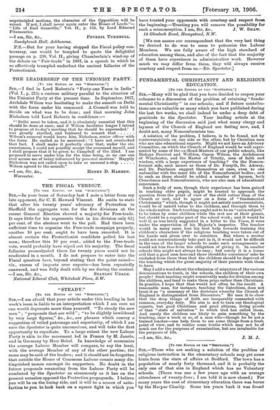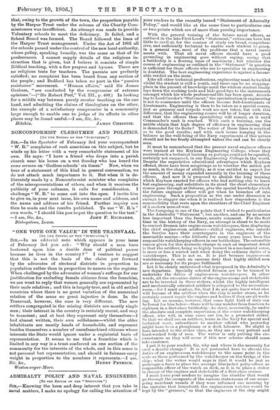[To THE EDITOR OP THE "SPECTATOR."] SIR,—Those who are seeking
a solution of the problem of religious instruction in the elementary schools may get some hints from the state of affairs at Bedford. The town has a population of nearly forty thousand, and it is probably the only one of that size in England which has no Voluntary schools. (There was one a few years ago with an average attendance of twenty-four ; I am told it is now closed.) For many years the cost of elementary education there was borne by the Harpur Charity. Some ten years back it was found
that,"owing to the growth of the town, the proportion payable by the Harpur Trust under the scheme of the Charity Com: missioners was insufficient. An attempt was made to provide Voluntary schools to meet the deficiency. It failed, and a School Board was formed. The Board followed the. lines of the Harpur Trust management. Under the Act of 1902 all the schools passed under the control of the new local authority, whose policy, speaking broadly, was the same as that of its predecessors. I cannot supply details of the religious in- struction that is given, but I believe it consists of simple Biblical teaching, with a few prayers and hymns. There are no religious tests for teachers. The parents are perfectly satisfied; no complaint has been heard from any section of the people; and Bedford has taken no part in the "passive resistance" movement. " Human affairs," said Sir James Graham, "are conducted by the compromise of extreme opinions."—(" Sir Robert Peel," Vol. III., p. 408.) In looking for a middle way between purely secular teaching on the one band, and admitting the claims of theologians on the other, the example of a satisfactory compromise in a community large enough to enable one to judge of its effects in other places may be found useful.—I am, Sir, &c.,











































 Previous page
Previous page